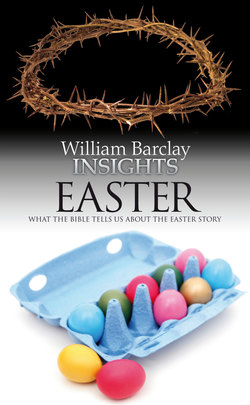Читать книгу Insights: Easter - William Barclay - Страница 10
На сайте Литреса книга снята с продажи.
ОглавлениеThe Lord’s Supper
1 Corinthians 11:23–34
For I received of the Lord that which I also handed on to you, that the Lord Jesus, on the night on which he was being delivered up, took bread, and, after he had given thanks, he broke it and said: ‘This is my body which is for you; this do that you may remember me.’ In the same way, after the meal, he took the cup and said: ‘This cup is the new covenant and it cost my blood. Do this, as often as you drink it, so that you will remember me.’ For as often as you eat this bread and drink this cup, you do proclaim the death of the Lord until he will come. Therefore whoever eats this bread and drinks this cup of the Lord in an unfitting way is guilty of a sin against the body and blood of the Lord. But let a man examine himself, and so let him eat of that bread and drink of that cup. For he who eats and drinks as some of you do, eats and drinks judgment to himself, because he does not discern what the body means. It is because of this that many among you are ill and weak and some have died. But, if we truly discerned what we are like, we would not be liable to judgment. But, in this very judgment of the Lord, we are being disciplined that we may not be finally condemned along with the world. So then, my brothers, when you come together, wait for each other. If anyone is hungry, let him eat at home, so that you may not meet together in such a way as to render yourselves liable to judgment. As for the other matters, I will put them in order when I shall have come.
NO passage in the whole New Testament is of greater interest than this. For one thing, it gives us our warrant for the most sacred act of worship in the Church, the sacrament of the Lord’s Supper; and, for another, since the letter to the Corinthians is earlier than the earliest of the gospels, this is actually the first recorded account we possess of any word of Jesus.
The sacrament can never mean the same for every person; but we do not need fully to understand it to benefit from it. As someone has said, ‘We do not need to understand the chemistry of bread in order to digest it and to be nourished by it.’ For all that, we do well to try at least to understand something of what Jesus meant when he spoke of the bread and the wine as he did.
‘This is my body,’ he said of the bread. One simple fact precludes us from taking this with a crude literalism. When Jesus spoke, he was still in the body; and there was nothing clearer than that his body and the bread were at that moment quite different things. Nor did he simply mean: ‘This stands for my body.’ In a sense, that is true. The broken bread of the sacrament does stand for the body of Christ; but it does more. To those who take it into their hands and upon their lips with faith and love, it is a means not only of memory but of living contact with Jesus Christ. To an unbeliever, it would be nothing; to all who love Christ, it is the way to his presence.
